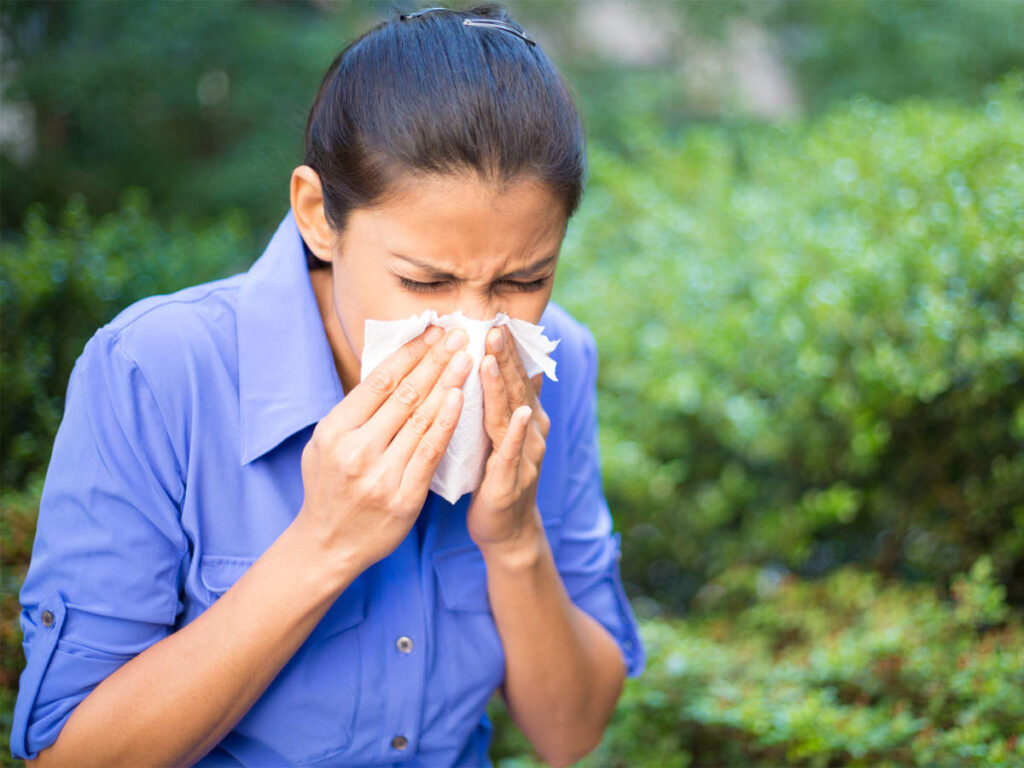Seasonal allergies – how can Ayurveda help?
Any person who is even slightly prone to allergies or has a history of asthma or eczema can be at the receiving end of allergies during the monsoon season. Your eyes will water on windy days or you may feel always stuffy when it rains. That’s no surprise. Weather is a common allergy trigger.

The connection between your symptoms and the weather depends on what you’re allergic to. Here are a few common triggers:
- Dry, windy days. Wind blows pollen into the air, causing hay fever. If you have pollen allergies, shut the windows and stay indoors on windy days.
- Rainy or humid days. Moisture makes mold grow, both indoors and out. Dust mites also thrive in humid air.
- Cold air. Many people with allergic asthma find that cold air is a problem, especially when they exercise outside. It can trigger a coughing fit.
- Heat. Air pollution is worst on hot summer days. Ozone and smog can be a serious trigger for people with allergic asthma.
As per Ayurveda the allergies are not only result of external factors. But internal health or immunity also plays a good part. From an Ayurvedic perspective, in addition to inherited tendencies, several other key factors determine whether a person experiences an allergic reaction and how severe that reaction will be. These include the strength of the individual’s digestive fire, or inner resilience (known as agni), the quantity of allergen that enters the body, and a person’s current state of balance/imbalance in the doshas. Fortunately, there are techniques to strengthen our agni, avoid allergen exposure, and improve our state of doshic balance. By addressing all of these factors, we can help prevent allergies as well as keep them under control.
Here are Ayurvedic approaches to help stop allergies in their tracks.
- Use a neti pot daily, or twice a day, with a weak saline solution and distilled water, to loosen up the heaviness of kapha in the sinuses. This also helps clear out allergens that may be sticking to the mucus membranes.
2. Prathimarsha nasya: Dab a little bit of sesame oil spiked with eucalyptus or camphor in each nostril about an hour after using your neti pot if your allegies are due to dry weather.
3. Avoid cold, heavy foods and drinks, including dairy, wheat, meat, sugar, processed foods, leftovers, and iced beverages, as they can slow down the digestion and dampen the agni.
4. Go on a kapha-reducing diet: Eat warm, light, natural, cooked foods that are easy to digest. Focus on fresh, organic vegetables and fruits. Cook the vegetables with a little bit of ghee (clarified butter) or olive oil to soothe the mucus membranes.
5. Use warming spices like ginger, cinnamon, black pepper, turmeric, cumin, and cayenne in your cooking.
6. Enjoy ginger tea throughout the day, as it sparks digestive fire.
7. Exercise daily, for 30 minutes or so, to help stimulate agni and eliminate ama. This can be a brisk walk, a fun fitness class, a vinyasa yoga class, a hike, a bike ride, or a dance class.
8. Do detoxification do balance the doshas in the body.
